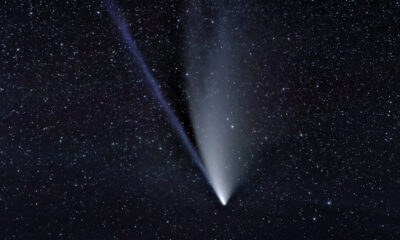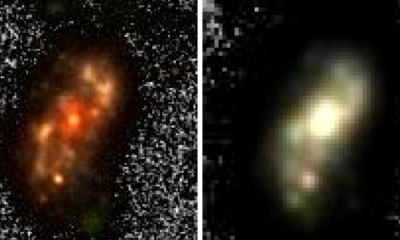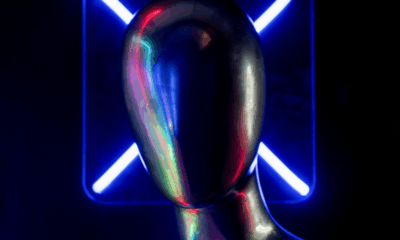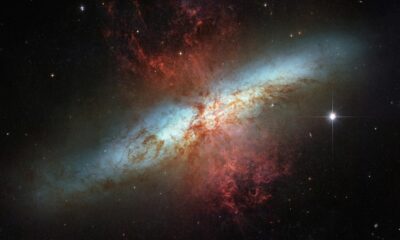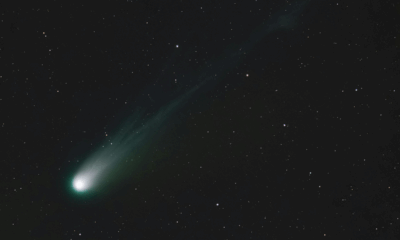Science
James Webb Telescope Reveals Secrets of the Butterfly Nebula
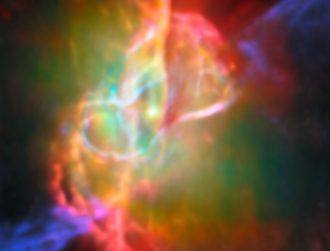
The James Webb Space Telescope has made a groundbreaking discovery regarding the Butterfly Nebula, revealing details about its central star that were previously unknown. This planetary nebula, located approximately 3,400 light-years away in the Scorpius constellation, is one of the most studied nebulae in the Milky Way galaxy and has now been captured in unprecedented detail.
Despite its name, the term “planetary nebula” does not relate to planets. Historically, astronomers used this term when they observed these objects appearing round in the sky. The Butterfly Nebula, however, defies this description with its striking, non-spherical shape resembling butterfly wings. It is classified as a bipolar nebula, characterized by two lobes extending in opposite directions.
New Insights from Mid-Infrared Observations
Utilizing the Mid-InfraRed Instrument (MIRI), Webb’s latest images focus on the nebula’s core, revealing a “never-before-seen” portrait of this magnificent celestial body. The MIRI is capable of capturing images across multiple wavelengths simultaneously, allowing scientists to analyze how the nebula’s appearance changes under different conditions.
In conjunction with the observations from Webb, researchers employed data from the Atacama Large Millimeter/submillimeter Array, leading to the identification of nearly 200 spectral lines. Each of these lines provides critical information about the various atoms and molecules present within the nebula.
One significant finding is the precise location of the Butterfly Nebula’s central star, which had eluded scientists until now. This star is surrounded by a previously undetected heat dust cloud, which emits a brilliant glow at the mid-infrared wavelengths. With a staggering temperature of 220,000 Kelvin, this star ranks among the hottest known central stars in planetary nebulas.
Discovery of Carbon-Based Molecules
Another intriguing aspect of Webb’s findings is the detection of light emitted by carbon-based molecules known as polycyclic aromatic hydrocarbons, or PAHs. On Earth, PAHs are commonly associated with sources such as campfire smoke and car exhaust. This discovery may represent the first evidence of PAHs forming in an oxygen-rich planetary nebula, further enhancing our understanding of these complex celestial environments.
This latest research from the James Webb Space Telescope not only sheds light on the Butterfly Nebula but also aligns with broader studies in the field. Earlier this month, a study led by the University of St Andrews suggested that free-floating planets could potentially create miniature planetary systems independent of a host star.
As scientists continue to unravel the mysteries of the universe, the James Webb Space Telescope stands at the forefront, providing invaluable insights into the life cycles of stars and the formation of complex molecules in space. The discoveries made through this mission enhance our understanding of the cosmos and its intricate phenomena.
-

 World3 days ago
World3 days agoCoronation Street’s Shocking Murder Twist Reveals Family Secrets
-

 Entertainment4 months ago
Entertainment4 months agoKate Garraway Sells £2 Million Home Amid Financial Struggles
-

 Entertainment3 months ago
Entertainment3 months agoAnn Ming Reflects on ITV’s ‘I Fought the Law’ Drama
-

 Health3 months ago
Health3 months agoKatie Price Faces New Health Concerns After Cancer Symptoms Resurface
-

 Entertainment3 weeks ago
Entertainment3 weeks agoCoronation Street Fans React as Todd Faces Heartbreaking Choice
-

 World4 weeks ago
World4 weeks agoBailey Announces Heartbreaking Split from Rebecca After Reunion
-

 Entertainment6 days ago
Entertainment6 days agoTwo Stars Evicted from I’m A Celebrity Just Days Before Finale
-

 World6 days ago
World6 days agoKevin Sinfield Exceeds Fundraising Goal Ahead of Final Marathons
-

 Entertainment3 months ago
Entertainment3 months agoCoronation Street’s Carl Webster Faces Trouble with New Affairs
-

 Entertainment3 months ago
Entertainment3 months agoWhere is Tinder Swindler Simon Leviev? Latest Updates Revealed
-

 Entertainment4 months ago
Entertainment4 months agoMarkiplier Addresses AI Controversy During Livestream Response
-

 Science2 months ago
Science2 months agoBrian Cox Addresses Claims of Alien Probe in 3I/ATLAS Discovery

